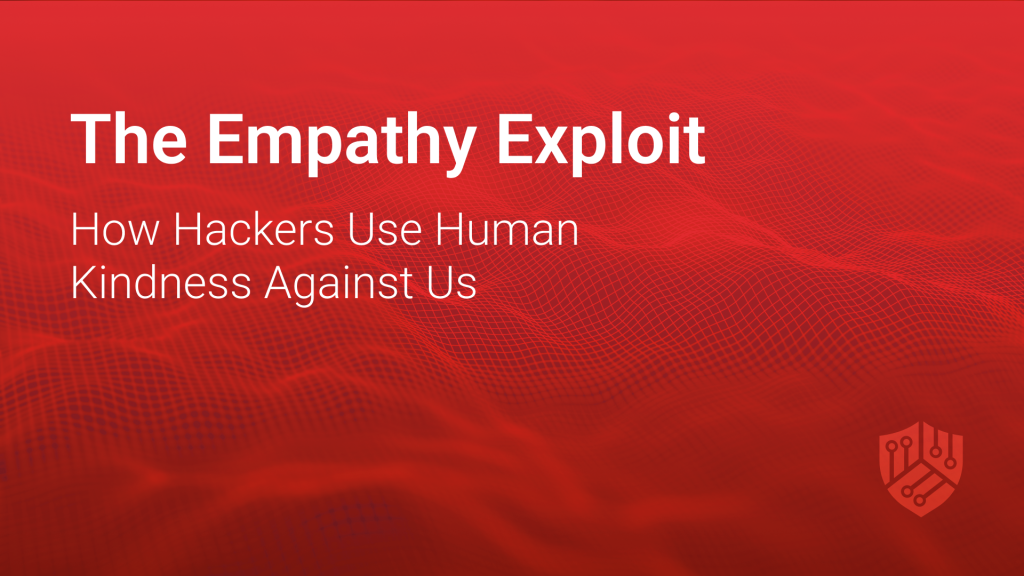August 14, 2025
The Empathy Exploit: How Hackers Use Human Kindness Against Us

In the digital age, our greatest weakness isn’t outdated software or unpatched systems—it’s our humanity itself. Cybercriminals have weaponised one of our most admirable traits: empathy. By analysing the intersection of cyber psychology and social engineering, the CyberFlow cybersecurity team understands how attackers systematically exploit human kindness. In a few words, they can transform our natural inclination to help into a gateway for sophisticated cyber attacks.
According to Verizon’s 2024 Data Breach Investigations Report, an estimated 68% of cyber attacks involve a human element, with empathy-based manipulation serving as a primary attack vector. This isn’t coincidental—it’s a calculated exploitation of fundamental human psychology.
The Psychology Behind Empathy-Based Attacks
Cyber psychology research demonstrates that social engineering manipulates victims by exploiting psychological, social, and emotional triggers. This allows scammers to bypass the employees’ critical thinking and gain access to valuable information.
Empathy represents the perfect psychological vulnerability because it’s deeply ingrained in human nature and difficult to suppress without appearing callous or unprofessional. By invoking empathy, fear and urgency in the victim, hackers are often able to gain access to personal information or the endpoint itself.
Attackers understand that when faced with apparent distress or urgent need for help, most people will lower their guard and bypass normal security protocols.
The empathy exploit operates on several psychological principles:
Authority and Hierarchy
Attackers pose as distressed supervisors or colleagues in crisis, leveraging both empathy and organisational dynamics to compel immediate action.
Social Proof
Creating scenarios where helping appears to be the socially expected response, making victims feel obligated to assist without proper verification.
Reciprocity
Establishing perceived relationships or past favours that make targets feel indebted to assist.
AI Social Engineering Attacks: The Next Evolution
The integration of artificial intelligence has dramatically amplified the effectiveness of empathy-based attacks. Recent advancements in artificial intelligence (AI) have amplified the effectiveness of social engineering techniques. Malicious actors have weaponised empathy, urgency and trust to trick individuals.
AI social engineering attacks now employ sophisticated deepfake technology to create unprecedented levels of authenticity. In February 2024, CNN reported that a finance worker at a multinational firm was tricked into transferring $25 million to fraudsters. The scammers used generative AI to create a convincing deepfake of the company’s CFO.
The CyberFlow team has observed the following advanced techniques in AI-powered attacks:
Voice Cloning
AI voice cloning technology enables attackers to create convincing impersonations of executives, family members, or colleagues, with cases documented of attempts to trick CEOs into transferring hundreds of thousands of dollars.
Deepfake Video Calls
AI-powered face-swapping can impersonate a victim’s friend during a video call, showcasing advanced AI-driven social engineering tactics.
Personalised Content Generation
AI algorithms analyse social media and public information to craft highly personalised, emotionally manipulative messages that appear authentic and urgent.
Social Engineering Red Flags: Identifying the Empathy Exploit
Recognising social engineering red flags requires understanding how empathy-based attacks typically unfold. Professional cyber psychology analysis reveals common patterns:
Urgency Combined with Emotional Appeals
Attackers create time pressure while simultaneously appealing to empathy, preventing targets from taking time to verify requests.
Authority Figures in Distress
Messages claiming to be from supervisors, executives, or respected colleagues are experiencing urgent problems requiring immediate assistance.
Bypassing Normal Procedures
Requests that specifically ask targets to circumvent standard verification processes “just this once” due to exceptional circumstances.
Emotional Manipulation
Appeals to sympathy, fear, or guilt are designed to override logical decision-making processes.
Name-Dropping and Social Connections
Social engineers exploit authority principles by name-dropping, mentioning that someone else (often with authority over the target) recommended communication.
Cyber Hygiene Tips: Building Empathy Resilience
Effective cyber hygiene tips must address both technical vulnerabilities and psychological manipulation. Building organisational resilience against empathy exploits requires systematic approaches:
Implement Verification Protocols
Establish mandatory verification procedures for all financial transactions, sensitive information requests, and system access changes, regardless of apparent urgency or authority level.
Create Empathy Checkpoints
Develop organisational policies that acknowledge empathy as a potential vulnerability. Train employees to pause and verify when emotional appeals accompany requests for action.
Multi-Channel Authentication
Require confirmation through multiple communication channels for sensitive requests, making it harder for attackers to maintain their deception across platforms.
Establish Safe Reporting
Create environments where employees feel safe reporting potential social engineering attempts without fear of embarrassment or repercussions.
CyberFlow: Building a Future of Human-Centred Security
The empathy exploit poses a huge challenge to cybersecurity practices. We have to rethink how to maintain our humanity while protecting against those who would weaponise it. The first step in this direction is recognising that cybersecurity isn’t just about technology. It also involves psychology, training, and creating organisational cultures that balance compassion with vigilance.
CyberFlow’s comprehensive security solutions can help your company build resilient defences against social engineering attacks while maintaining the human connections that drive business success. Contact us to learn how we can strengthen your human firewall against the empathy exploit.
About Us
If you are interested on apply more security to your business contact us
